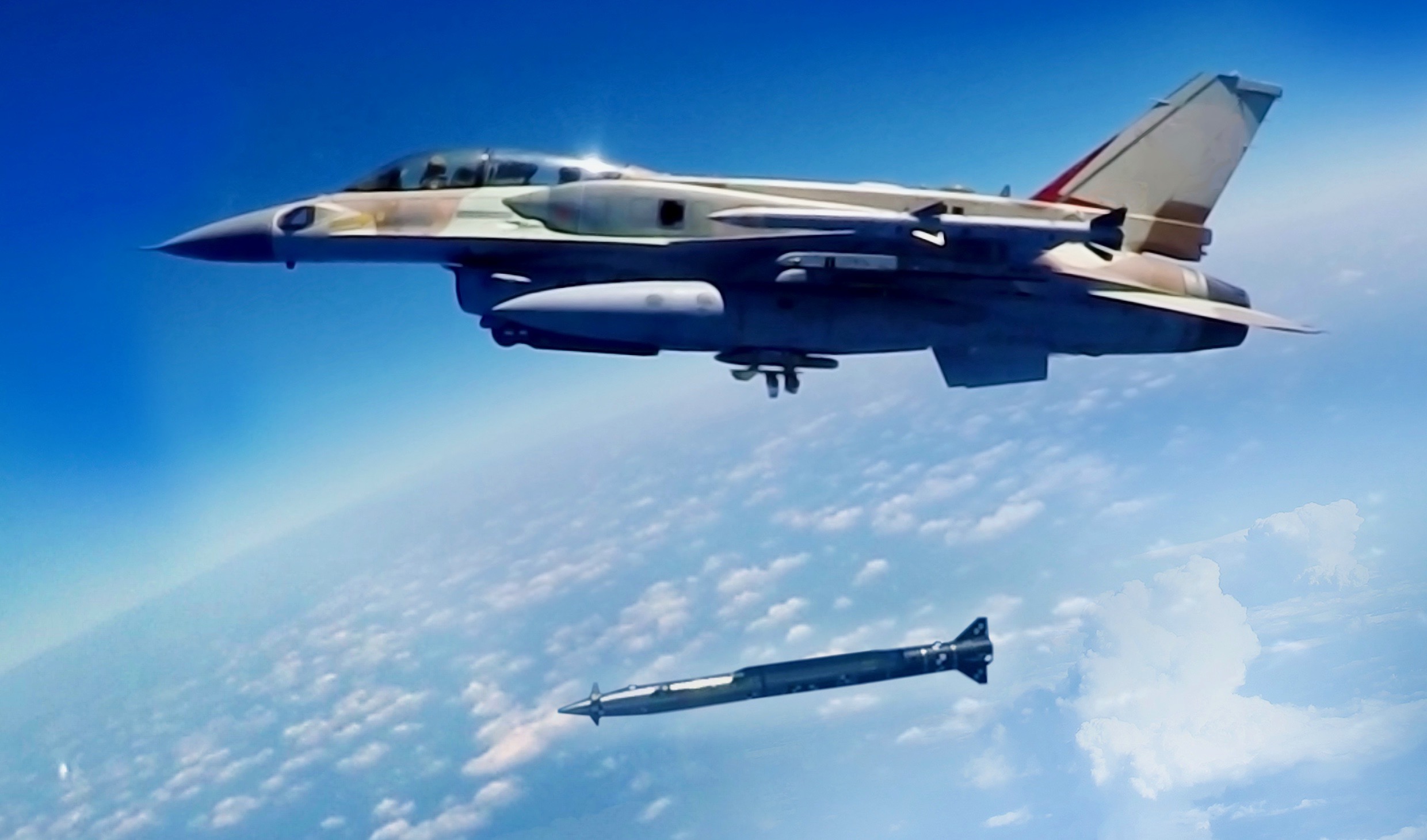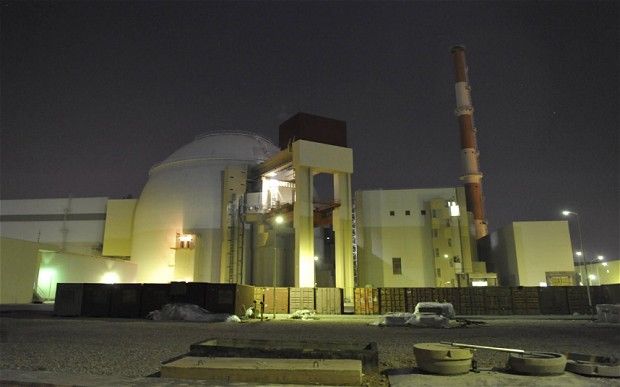Israel Spends With Eye On Iran Strikes In Shifting Mideast
Posted on

Israeli rampage missile
TEL AVIV: Israel is preparing to buy a range of new weapons in preparation for a possible attack on Iran should that country appear to restart efforts to develop a nuclear weapon.
Israel has reportedly already invested more than $2 billion preparing for a possible attack against Iran.
On Israel’s shopping list: a new aerial refueling aircraft and new weapons such as the IAI/IMI Rampage missile just unveiled by Israeli Military Industries Systems (IMI Systems) and Israel Aerospace Industries (IAI) This long-range assault missile was developed jointly by the two Israeli companies.
The Rampage would be used by Israel’s F-35s in a strike against Iranian forces but can be used on most other Israeli strike aircraft. The companies say the Rampage is designed to destroy targets such as command and control centers, air force bases, maintenance centers, infrastructures and valuable targets protected by sophisticated anti-air systems.
IAI and IMI say the Rampage offers simplified operation, with no need for a “man in the loop.” The total weight of the missile is 570 kg and it is 4.7 meters long. Range is estimated at 150 km.
Israeli Defense Minister Avigdor Lieberman said after the U.S decision to pull out of the JCPOA that, despite Iran’s threats, he thinks they will remain in the nuclear agreement.
“The Iranians here are walking on the thin line and trying to signal, trying to blackmail, threaten, but I doubt if they end up going to go out of the deal because they understand that, at that moment, it will strike very hard even in the markets inside Iran and in all parameters of the Iranian economy,” he said in a closed meeting early last week.

However, that doesn’t mean Israel will be passive about the Iranian threat: “We have never lowered any option on Iran, all the options on the table.”
The Israeli plan to buy new weapons is made more likely by President Trump’s decision to leave the Iran nuclear deal, known as the JCPOA. But Israel’s intent to beef up its strike capabilities comes as part of a wider reordering of the strategic situation in the Middle East.

Israeli F-35A, known as Adir.
Iran and Saudi Arabia have been engaged in a secret war for some decades trying to gain regional supremacy from Iraq to Syria and Lebanon to Yemen.
President Donald Trump has strongly backed Saudi Arabia in its efforts to counter Iran’s influence in the region. For their part, the Saudis have praised Trump for pulling out of the Iran nuclear deal, which they considered meaningless paper, just as Israel does.
Amos Gilead, former head of the Military Intelligence Research Division and director of Policy and Political-Military Affairs at the Ministry of Defense, told Breaking Defense that the Iranians will not be deterred by Trump’s threats: “The nuclear deal serves them and will allow them, after 10 years, to dash quickly to the bomb.”
How does the U.S pulling out of the Iranian nuclear deal affect the situation in Syria, host to a great number of Iranian military personnel?
“Israel is determined not to allow Iran to get a strong foot hold in Syria. The Russian interest is not to allow Iran to gain too much influence in Syria” Gilead said.
Is there operational coordination between Israel and Russia as to what Israel can do to block the Iranian build-up in Syria, I asked Gilead? “Israel does not notify Moscow on planned attacks on Iranian targets in Syria. They cannot be trusted. When, according to foreign sources, Israel attacks Iranian targets in Syria, the Russians are passive.”
But Israel is looking at Iran not only in the nuclear context. Iran has been trying to build a military capability on the Israeli-Syrian border.
In recent months, the Israeli airforce and other IDF units repeatedly destroyed shipments of advanced arms that Iran has sent to Syria, sometimes just hours after they were offloaded from Iranian cargo planes.
Meanwhile, Israel’s intelligence apparatus has been busy getting more and more facts to support the claim that the U.S and Europe were misled by Teheran.
Meanwhile, there are unconfirmed reports by the Kuwaiti newspaper Al-Jarida that Israeli F-35 fighter jets entered Iranian airspace over the past month.
The Iranians dismissed the report, but Ayatollah Ali Khamenei replaced Brig. Gen. Farzad Esmaili as commander of Iran’s air defenses just a few days later. Brig. Gen. Alireza Sabahi Fard is the new commander. And the ayatollah decreed that Brig. Gen. Sabahi Fard would now command Khatam al-Anbia Air Defense Base, central headquarters of Iran’s air defenses.
The U.S has increased stockpiles of military hardware stored in Israeli bases recently. The U.S. stores equipment in Israel by virtue of a special clause in U.S. foreign aid law governing war reserves stockpiles for allies. According to the clause, the equipment can be utilized by American forces throughout the world, and also, in an emergency, by the military in the country where the equipment is stored. The clause was originally intended to allow South Korea to use of American equipment in case of a surprise attack by North Korea.
Amos Gilead says that the U.S stockpiles of military hardware in Israel are only intended for use by the American forces; “any other use is subject to decision to be made in Washington.”
Israel and the U.S. share the assessment that Iran could use its regional militant allies or proxies , to retaliate against airstrikes on Iranian targets in Syria allegedly perpetrated by Israel.
Iran’s greatest achievement is Hezbollah that has formed a “country within country ” in Lebanon but the organization has been hardly battered in the Syrian war. Supporting embattled Syrian President Bashar Assad has resulted in hundreds of its fighters killed and wounded.
Amos Gilead says that with 120.000 rockets, the Hezbollah in Lebanon, is deterred from using them against Israel. “The Israeli operations in Syria and Lebanon , are aimed at foiling the organization’s target of building a second layer of longer range, more precise rockets made in Iran”
Mordechai Kedar, an Israeli expert in Middle Eastern affairs, says that if it is true that Russia is acting to get Iran out of Syria it will be a colossal loss for Teheran. “They put billions of U.S dollars in their presence in Syria, and that’s without mentioning the loss of hundreds of (members of) the Republican Guards and other militias led by Teheran.”
Kedar says Russia and America share the goal of keeping Assad in power. “That is why the Russians will swallow that bitter pill, because they know that without Assad the chaos will be even bigger and, as a matter of fact, uncontrollable.”
Iran has dismissed president Trump’s threats heard after the U.S pulled out of the nuclear deal . Can it really dismiss these threats ?
“No way. Trump, unlike Obama, means business and the Iranians know it” Kedar told Breaking Defense.
Yemen is another country that must be looked at in the context of Iranian influence.
Yemen’s Iranian-aligned Houthi movement, which destroyed the Saudi-backed government in Yemen in March of 2015 and now controls northern Yemen, has fired more than 100 missiles into Saudi Arabia.
Those missiles have targeted the Saudi capital and key oil production facilities near Yemen, as well as Saudi oil tankers.
The United States and the Saudi-led coalition that intervened in Yemen’s civil war in 2015 accuse Iran of providing the missiles to its Houthi allies, which Tehran denies.
The Saudi-led coalition has launched thousands of air strikes on Yemen in the past three years, some of which have hit hospitals, schools and markets, killing hundreds of civilians while bringing Riyadh little closer to military victory.
The kingdom has said hundreds of its own soldiers and civilians have been killed in Houthi mortar and short-range missile attacks across their rugged southern border.
Kedar said that the Iranian aim is to crush Saudi Arabia using what he calls a “nutcracker” movement. When Obama was in the White House he did not care about Saudi Arabia. Now there is a new boss in the Oval Office, and things will be handled differently.”
Subscribe to our newsletter
Promotions, new products and sales. Directly to your inbox.
